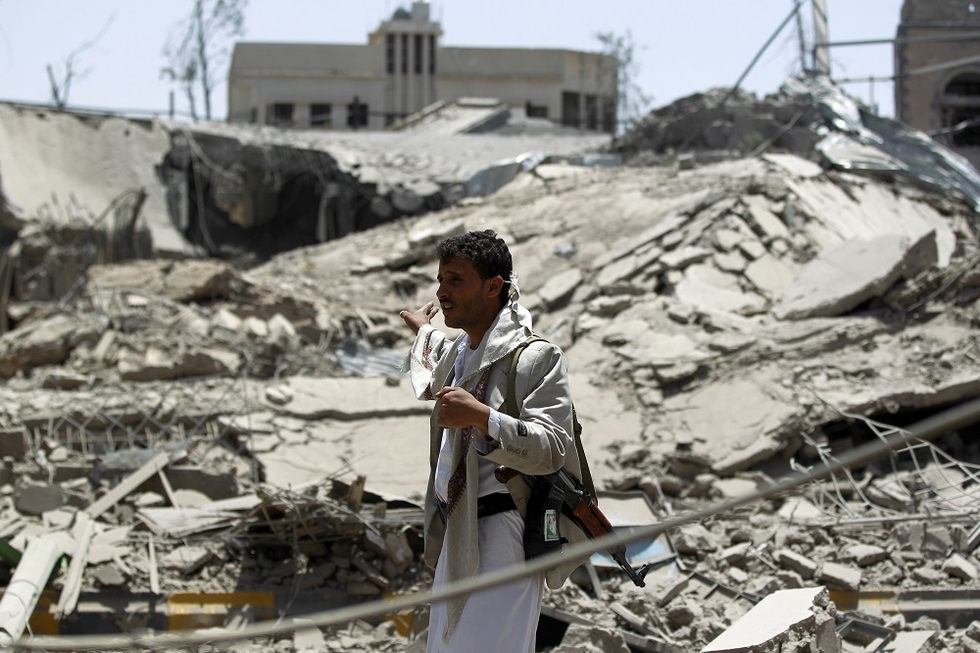Support for Saudi Arabia's war in Yemen targeted by bill in US Congress

Pulling support for Saudi Arabia’s war in Yemen is not enough: the United States must go further and probe whether its decades-old ties with Riyadh have helped it – or simply sucked Washington into divisive, bungled Middle Eastern quagmires, US Congressman Ro Khanna told Middle East Eye.
Khanna, a Democrat representative for California’s Silicon Valley area, urged the House to vote this week on his bill to stop helping the Saudi-led coalition with military targeting and the mid-air refuelling of warplanes in Yemen.
“The average person in my district, or Ohio or Pennsylvania, does not want us risking American troops or spending American tax dollars on fighting the Houthis in Yemen, and they certainly don’t want us complicit in human rights violations,” Khanna told MEE on Wednesday.
Khanna’s bill says Congress was never asked if the US should effectively join Riyadh’s assault on the Iran-backed Houthi rebels of northern Yemen, and demands that it exit the war within 30 days of an affirmative vote.
The average person...does not want us risking American troops or spending American tax dollars on fighting the Houthis in Yemen
- Ro Khanna, US Congressman
The bill’s opponents say it does not meet the criteria needed for a fast-tracked House vote, which could otherwise occur this week. Previous congressional efforts to halt US arms supplies to the Saudi-led coalition came close, but did not pass.
Congress granted the White House broad war-making powers after the 9/11 attacks, but that did not authorise helping Saudi fight the Houthis, said Khanna. The war may well assist the real US enemy there – al-Qaeda in the Arabian Peninsula.
Progressives and right-wing constitutionalists view open-ended Middle Eastern conflicts as liabilities and are increasingly challenging a foreign policy establishment of hawks, neo-conservatives and liberal interventionists, said Khanna 40, a former law scholar.
“There is a re-orientation in our relationship with Saudi Arabia, a recognition we should not be aiding their regime and its human rights violations or supporting the export of extremist ideology,” Khanna told MEE.
Saudi's controversial war in Yemen
The Saudi-led coalition’s war in Yemen has proven increasingly controversial in the US and Britain – two Western countries that supply Riyadh with the weapons, intelligence and other support in its two-and-a-half-year-old conflict.
Fighting has claimed 10,000 lives in a nation of 28 million people, where a quarter of the population is starving, the United Nations says. At least 2,135 people, most of them children, have died in a virulent cholera outbreak these past six months.
UN figures released this month said the alliance had caused death and injury to 683 children in 2016, including in attacks on schools and hospitals – earning the coalition a spot on a global blacklist of children’s rights violators.
Former US President Barack Obama originally approved support for Saudi, the United Arab Emirates and other US allies in a move that was widely viewed as a concession to Riyadh over Washington’s 2015 nuclear deal with its regional foe, Iran.
Currently, aerial refuelling provided by American aircraft enables bombing runs by Saudi and UAE warplanes, while the US government provides the coalition with intelligence and fresh supplies of weapons.
The conflict pits President Abd-Rabbu Mansour Hadi's Saudi-backed government, which controls south and eastern Yemen, against the Houthis and other rebel groups in a shaky alliance with forces loyal to ousted President Ali Abdullah Saleh.
According to Amnesty International and other rights watchdogs, coalition jets have destroyed hospitals, schools and, last October, killed 140 civilians in a mistaken strike on a funeral in the Yemeni capital, Sanaa.
“The USA and other states that supply arms for use by the Saudi Arabia-led coalition in Yemen must stop doing so and the UN Security Council should impose an arms embargo to bring an end to such horrific abuses,” said Sherine Tadros, head of the UN office for Amnesty International in New York.
Saudi officials say they work to minimise civilian casualties and have accused the Houthis of using human shields. The Pentagon says it has tried to help the Saudis improve targeting in its Yemen campaign.
Previous Congressional attempts to limit Saudi support
Khanna’s bill is not the first time lawmakers have addressed Yemen.
In June, the Senate narrowly voted to support a $510m sale of precision-guided munitions to Riyadh, defeating a resolution to block the sale in a 47-to-53 vote that was backed by all Democrats in the upper house.
In June 2016, the House voted against an amendment that would have blocked the transfer of US-made cluster bombs to Saudi in a 204-to-216 vote.
Neither measure passed, but they signalled growing frustration in Washington as Saudi-led involvement drags out longer than expected into a bloody stalemate causing civilian suffering.
Things are different now, Khanna said.
His bill is co-sponsored by another progressive Democrat, Mark Pocan of Wisconsin, and two Republicans – Thomas Massie of Kentucky and Walter Jones of North Carolina – who say that Congress must authorise US-backed wars.
Meanwhile, activists have staged anti-Saudi protests in Washington. Such luminaries as the intellectual Noam Chomsky, actor Martin Sheen and legal scholar Bruce Ackerman have signed a letter supporting the bill, according to HuffPost.
Speaking on Wednesday, Khanna said support for Riyadh’s war was ebbing and that his bill – or even a watered down version of it – would lead to tighter restrictions on arms supplies or the refuelling of coalition jets.
“We continue to make these balance-of-power calculations that make the US less safe, create a blowback of hatred against the US and foster extremism. It is a completely flawed strategy to try and support Saudi Arabia in some kind of check against Iran,” Khanna told MEE.
Middle East Eye propose une couverture et une analyse indépendantes et incomparables du Moyen-Orient, de l’Afrique du Nord et d’autres régions du monde. Pour en savoir plus sur la reprise de ce contenu et les frais qui s’appliquent, veuillez remplir ce formulaire [en anglais]. Pour en savoir plus sur MEE, cliquez ici [en anglais].




